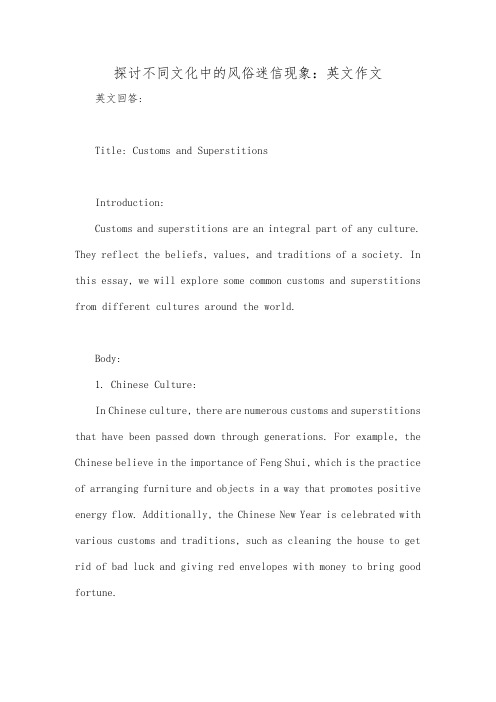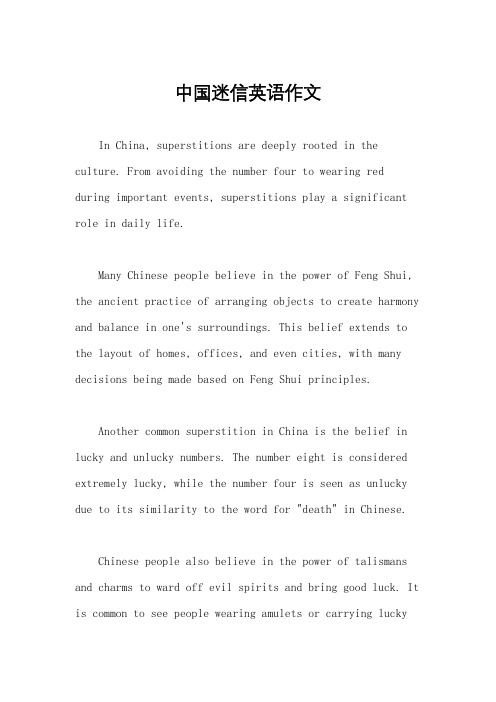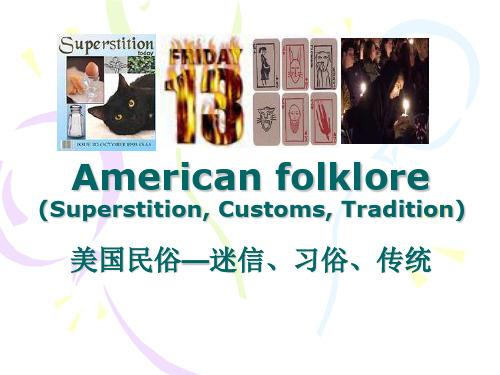superstitions
superstition

Good afternoon,I will make up for last regret.Now,Let’s talk about several the superstition about the cat.In western countries, there are many legends(传说) about the cat, so we will see some superstitions in different countries.∙In the first sentence, the superstition means cat can tell master when the guest arrive. In fact, Some of theareas in Henan province are there similar sayings, such as Luoyang. If you hold odd root chopsticks, it meansimportant guests will go your home。
∙Although the second and third sentence are superstitions, I checked the related information, the twosentences more or less still have some scientific evidence∙The cat's skin contains temperature sensor(传感器), so that perception(知觉)of the surrounding environment rise or fall,the cat will find the most warm place for sleep or when it's cold crimp body(猫的皮肤上含有温冷感受器,以便感知周围环境的温寒,寻找最温暖地点睡觉或天冷时卷曲身体)In the third sentence, when it rains will increase humidity (湿度), flea (跳蚤) in cat body activity up,So the cat will keep scratching。
Supertitions 美国迷信

Florida International University
The large cube in front of Deuxième Maison is said to give good luck in exams and tests and thus is spun by hundreds of students every semester. During final exams, a line forms around the cube with people waiting to be able to spin the cube for good luck on their exams. The top floor of Green Library is said to be haunted; students have reported a friendly ghost that wanders the halls minutes before the library closes at night.
If a ship's cat fell or was thrown overboard, it was thought that it would summon a terrible storm to sink the ship and that if the ship was able to survive, it would be cursed with nine years of bad luck. Other beliefs included, if a cat licked its fur against the grain, it meant a hailstorm was coming; if it sneezed it meant rain; and
探讨不同文化中的风俗迷信现象:英文作文

探讨不同文化中的风俗迷信现象:英文作文英文回答:Title: Customs and SuperstitionsIntroduction:Customs and superstitions are an integral part of any culture. They reflect the beliefs, values, and traditions of a society. In this essay, we will explore some common customs and superstitions from different cultures around the world.Body:1. Chinese Culture:In Chinese culture, there are numerous customs and superstitions that have been passed down through generations. For example, the Chinese believe in the importance of Feng Shui, which is the practice of arranging furniture and objects in a way that promotes positive energy flow. Additionally, the Chinese New Year is celebrated with various customs and traditions, such as cleaning the house to get rid of bad luck and giving red envelopes with money to bring good fortune.2. Indian Culture:India is known for its rich cultural heritage and diverse customs and superstitions. One common superstition is the belief in the evil eye, which is thought to cause harm or misfortune to others. To ward off the evil eye, people often wear protective amulets or use special rituals. Another interesting custom is the practice of touching the feet of elders as a sign of respect and seeking their blessings.3. Western Culture:In Western cultures, there are also many customs and superstitions. For instance, it is considered bad luck to walk under a ladder, as it is believed to bring misfortune. Breaking a mirror is believed to bring seven years of bad luck. Additionally, throwing salt over the shoulder is a superstition to ward off evil spirits.Conclusion:Customs and superstitions play a significant role in shaping a culture and its people's beliefs. They provide a sense of identity and connection to the past. While some may view them as mere superstitions, they continue to be practiced and cherished by many around the world.中文回答:标题:风俗与迷信介绍:风俗与迷信是任何文化的重要组成部分。
中国迷信英语作文

中国迷信英语作文In China, superstitions are deeply rooted in the culture. From avoiding the number four to wearing red during important events, superstitions play a significant role in daily life.Many Chinese people believe in the power of Feng Shui, the ancient practice of arranging objects to create harmony and balance in one's surroundings. This belief extends to the layout of homes, offices, and even cities, with many decisions being made based on Feng Shui principles.Another common superstition in China is the belief in lucky and unlucky numbers. The number eight is considered extremely lucky, while the number four is seen as unlucky due to its similarity to the word for "death" in Chinese.Chinese people also believe in the power of talismans and charms to ward off evil spirits and bring good luck. It is common to see people wearing amulets or carrying luckycharms with them at all times.One of the most well-known superstitions in China is the belief in the Chinese zodiac. Many people consult their zodiac sign for guidance on important decisions and events in their lives.Despite the modernization of society, superstitions continue to play a significant role in Chinese culture. Whether it is wearing red for luck or avoiding the number four, superstitions are deeply ingrained in the daily lives of many Chinese people.。
superstition

Here is a list of 40 classic Chinese superstitions:When having a baby*If you're pregnant, use of glue will cause a difficult birth.*If you strike an animal during pregnancy, the newborn child will look like that animal and behave like one.*You should never praise a newborn baby because it will invite evil spirits and ghosts.*A concave navel means a prosperous life.*A baby with more than one hair crown will be mischievous and disobedient. *A baby with wide and thick ears will live prosperously.Before you get married*Wedding clothes should be red, yellow and/or white.*Wearing black, blue or gray will bring bad luck to the marriage.*Couples with the same surname cannot marry; even if they are not related, they still belong to the same ancestry.*A boy, preferably born a Dragon, must roll over the newlywed's matrimonial bed to ensure good luck and a baby boy.*Never marry someone who is older or younger by 3 or 6 years.Good Feng Shui*The number of steps in a staircase should be even-numbered.*It is bad luck to have two room doors face each other.*It is bad luck if your door or gate directly faces a road.*Don't build your house facing the north.*The master's bedroom should not be situated right above the garage.*The dining area should not be under a second-floor toilet.Going to funerals*An improper funeral will bring ill fortune and disaster.*Statues of deities must be covered with red cloth of paper.*Mirrors must be hidden; a person who sees the reflection of the coffin will have a death in his/her family.*White cloth must be hung across the doorway of the house.*The deceased's children and grandchildren should not cut their hair for 49 days. *After leaving a wake, do not go straight home lest the ghost of the dead follows you.Lucky and unlucky colors*Red is the color of blood or life and will bring happiness, wealth, fame, and good luck.*Black is the color of feces and is associated with evil, disaster and bad fortune. *White is the color of mother's milk. It symbolizes moderation, purity, honesty and life and balances red and black.Lucky and unlucky numbers*The luckiest number is eight because its Chinese word also means "prosper". *The unluckiest number is four as it sounds like the Chinese word for death.*Seven can also signify death.*The number one means loneliness.*The number "9" is good, because nine in Cantonese sounds like the word "sufficient".About time*Clipping toenails or fingernails at night is bad luck; the person will be visited by a ghost.*If a dog howls continuously at night, this means death.*Hearing a crow cawing between 3 and 7 am means the hearer will receive gifts; hearing a crow caw between 7 and 11am means rain and wind; and between 11am and 1pm means quarrels.*If a man's ears burn between 11pm and 1pm, there will be harmony between him and his wife; if they burn between 1 and 3 in the afternoon, a guest will soon arrive.Things you should never do*Beating a person with a broom will rain bad luck upon that person for years. *Wearing a moustache is considered bad luck.*Never point at the moon or your ears might get chopped off.*Don't sweep the floor on New Year's Day lest you sweep away the good fortune. *Don't keep a pet turtle or it will slow down your business.While many Chinese people today may not believe in these dos and don'ts, these Chinese superstitions (by the name of "traditions" and "customs") are still practiced. They are kept because most families realize that it is these "old stuffs", whether believed or not, that provide continuity with the past and provide the family with an identity.Still, superstitions are an essential part of culture. They give us a peek into the lives of our ancestors and can provide many insights on the practices, attitudes, principles, and religious beliefs of different cultures. A special report on the effect of superstitions on the nation's youth related that 85% of China's middle school students have actually had their fortune told!。
中国传统迷信英语作文

中国传统迷信英语作文Traditional Chinese Superstitions。
China is a country with a rich cultural heritage, and one aspect of this heritage is the prevalence of traditional superstitions. These superstitions, passed down through generations, have become deeply ingrained in the Chinese psyche, influencing the beliefs and behaviors of many individuals. In this essay, we will explore the various traditional Chinese superstitions and their impact on the lives of the people.One of the most well-known Chinese superstitions is the belief in the power of numbers. Certain numbers, such as 4 and 13, are considered unlucky, while others, like 8 and 9, are seen as auspicious. This belief in the significance of numbers permeates various aspects of Chinese life, from the selection of house numbers to the timing of important events. For example, many Chinese people avoid moving into a house with the number 4 in the address, as the word for "four" in Chinese is phonetically similar to the word for "death." Similarly, the number 8 is highly prized, as it is associated with wealth and prosperity.Another prevalent superstition in China is the belief in the power of feng shui, the ancient art of arranging the physical environment to create harmony and balance. Feng shui principles are applied to the placement of furniture, the orientation of buildings, and even the selection of burial sites. Practitioners of feng shui believe that the careful arrangement of these elements can bring good fortune and ward off negative energy, known as "chi." This belief in the interconnectedness of the physical and spiritual worlds is deeply rooted in Chinese culture and has influenced the design and construction of many buildings, both ancient and modern.The concept of yin and yang, the opposing yet complementary forces that govern the universe, is another fundamental aspect of Chinese superstition. This belief in the balance of opposing elements is reflected in various aspects of Chinese life, from the choice of colors and materials used in home decor to the timing of important events. For example,many Chinese people believe that wearing red, a symbol of good luck and prosperity, can help to attract positive energy and ward off negative influences.In addition to these more well-known superstitions, there are countless other beliefs and practices that are deeply rooted in Chinese culture. These include the avoidance of certain foods or activities during specific times of the year, the use of talismans and amulets to protect against evil spirits, and the belief in the power of ancestral spirits to influence the lives of their descendants.Despite the prevalence of these traditional superstitions, it is important to note that not all Chinese people adhere to them with the same level of fervor. In recent years, there has been a growing trend towards modernization and secularization, particularly among younger generations. Many Chinese people have embraced a more rational and scientific worldview, and have begun to question the validity of these traditional beliefs.However, it is undeniable that the influence of these superstitions continues to be felt in various aspects of Chinese society. From the design of buildings to the planning of important events, the beliefs and practices associated with these superstitions remain an integral part of the Chinese cultural landscape.In conclusion, traditional Chinese superstitions are a fascinating and complex aspect of the country's rich cultural heritage. While some may view these beliefs as outdated or irrational, they continue to hold a significant place in the lives of many Chinese people, shaping their behaviors, beliefs, and attitudes towards the world around them. As China continues to evolve and modernize, it will be interesting to see how these traditional superstitions adapt and evolve alongside the changing social and cultural landscape.。
英语迷信superstitions

• THE COLOR BLACK IS ALSO ASSOCIATED WITH EVIL
QUESTIONS: HAVE YOU EVER WALKED UNDER A LADDER OR DO YOU AVOID IT?
3. SPILLING SALT
• SPILLING SALT IS CONSIDERED BAD LUCK • THIS SPICE WAS EXTREMELY EXPENSIVE
BACK • AT THE END OF A RAINBOW IS A POT OF GOLD • A RABBIT’S FOOT BRINGS GOOD LUCK • GARLIC PROTECTS AGAINST VAMPIRES • RUNNING AROUND THE HOUSE WITH LUGGAGE
1. FRIDAY THE 13TH
• FRIDAY THE 13TH IS CONSIDERED AN UNLUCKY DAY (ACCORDING TO CHRISTIAN TRADITION, JESUS DIED ON A FRIDAY)
• THE NUMBER “13” HAS BEEN CONSIDERED UNLUCKY FOR A LONG TIME SINCE “12” IS CONSIDERED TO BE THE PERFECT NUMBER (12 MONTHS / 12 HOURS ON THE CLOCK / 12 APOSTLES / ETC.)
美国的民俗American folklore

3. About Death
• Different cultures all have their way to foresee death’s approach. This traditions and stories take away some of death’s mystery; they make it seem more knowable, and thus less frightening. • Most people in America believe that: • Meeting a crow on the street is a sign of a funeral • If a hen crows, there will be a funeral • When a dog howls, there will be a funeral • The last person mentioned by a dying person will be the next to die.
Ⅰ. Definitions
• What is folklore?
• Folklore is a collection of all mental frameworks, rules, categories, and patterns that a particular group of people have collected and passed along from generation to generation. • Folklore can take many forms, songs, stories, arts, and proverbs…among which superstitions, customs, and traditions are the only way that folklore is expressed in the lives of ordinary people.
- 1、下载文档前请自行甄别文档内容的完整性,平台不提供额外的编辑、内容补充、找答案等附加服务。
- 2、"仅部分预览"的文档,不可在线预览部分如存在完整性等问题,可反馈申请退款(可完整预览的文档不适用该条件!)。
- 3、如文档侵犯您的权益,请联系客服反馈,我们会尽快为您处理(人工客服工作时间:9:00-18:30)。
One for sorrow, (看见一只喜鹊会带来悲伤和坏运气) Two for mirth, (看见两只喜鹊会带来快乐和欢笑) Three for wedding,(看见三只喜鹊会带来婚庆和欢声笑语) Four for birth,(看见四只喜鹊会带来新生的婴儿) Five for silver, (看见五只喜鹊会捡到银子)
The British Superstitions Customs
英国的迷信风俗
1. Lucky Numbers 7 幸运数字7
• “7”,it has an unusual significance in the western world. As if Chinese people think that ‘8’ means “get rich”,‘6’ means “well”.‘7’ is also a lucky number in western world. The ancient Greek philosophers of the Pythagorean (毕达哥拉斯哲学)once described “7” as a perfect digital, the first prize of the slot machines in casino also is ‘777’, so we can see the visible special place of this number. So, on July 7,2007, for those superstitious British people, this day is a good lucky day ,it is not surprising that so many people get married on this day.
• 虽然大部分的英国人不善厨艺,但在饮食方面他们也有一些迷信的讲究。在吃完煮鸡 蛋的时候英国人会有个奇怪的举动,就是要用勺子戳穿剩下的鸡蛋壳。原来,英国人 认为吃剩的鸡蛋壳里通常会藏着小恶魔,如果不把恶魔赶走的话,全家都会遭受到厄 运。
2014-12-22
4.Touching wood to bring good luck
5.Lucky Four Leaf Clover幸运的四叶草
• In British, if you can find a four leaf clover ,then you will be surrounded by happiness. Back in the Middle Ages, Christians found that this plant occasionally appear a form of four leaves, like a cross. They think that Four Leaf Clover is a magical plant, is the baby god favored, can help people drive away the devil and save the world. And the person who could find the Four Leaf Clover will have the power to predict disaster. So it is acknowledged as lucky keepsake, called lucky grass. In addition , its four leaves respectively represent love, health, fame and wealth.
• There is a proverb in domestic :”the magpies called, there is a happy event.” The magpies are recognized as a precious bird by Chinese people. In Britain it is also like that ,but it is decided according to the number of magpies.
3.Pierce the egg shell刺穿蛋壳
• The British people have a strange behavior when they are eating up the boiled eggs, they will pierce the remaining shell with their scoop. Originally, British people think that the remains of the egg shell usually hidden a little devil, if they don’t drive the little devil away, the whole family will suffer bad luck.
2014-12-22
2.Why people say “bless you” when they sneezed 打了喷嚏为什么要说bless you
• Generally speaking. In Britain if someone sneezed ,his friend who sit next to him will say “bless you ”. Many people think this is just a polite behavior . In fact ,a lot of people think that in that moment, the soul will rush out from your body, and the Satan just take this opportunity to steal your soul. In order to prevent the soul been stolen , the next person will put a curses that is bless you to protecting and blessing you. as you sneezed , if someone say “bless you ”,by the time don’t forget to thank him.
2014-12-22 six for gold。 (看到六只喜鹊会捡到金子)
7.The raven on the London tower伦敦塔里
的乌鸦
• Contrary to the magpies, in china ,the crow is a ominous bird. will bring bad luck. But British royal treat the crow as a baby. Because there is a legend in Britain: if all the raven on the London tower leave, Britain will collapse. In order to respect the old legend ,the government is still undertake the spending, raise ravens in the tower. In order to ensure that these crow would not leave the tower ,and their wings actually have been cut off ,so they lose flying ability ,but they also receive carefully care and attention. At present , there are 7 crow in the tower, their names are: the Hardey, Thor, Odin, Gwyllum, Cedric, Hugin, and Munin, they all become very popular among tourists.
•
在英国人看来,如果你能找到一只四片叶子的三叶草,你将会被幸福围绕。早在中世 纪,基督教徒们意外的发现这种植物偶尔会出现有四叶的形态,酷似十字架。他们就 认为四叶的三叶草是具有魔力的植物,是上帝恩赐到人间的宝贝,可以帮助他们驱赶 魔鬼,拯救世人。而发现四叶三叶草的人便会具有奇特的能力,能够预知灾祸。所以, 四叶的三叶草就被当时的人们公认为是幸运的信物,称做幸运草。另外,它的四片叶 子分别代表着爱情、健康、名誉及财富,
• “7”在西方世界里有着不同寻常的意义。就好像在中国人们认为“8”是 “发财”,“6”是“顺利”的意思一样,“7”在西方的文化里也是个吉祥 的数字。古希腊的哲学家毕达哥拉斯也曾经形容“7”是个“完美的数字”, 就连赌场里老虎机所设的头奖也都是777,可见这个数字的特殊之处。所以, 2007年7月7日对于那些迷信的英国人来说可是一个千载难逢,大吉大利的好 日子,有这么多人赶在这天结婚也就不足为奇了.
一般来讲,在英国如果有人打喷嚏,他身边的人必定会说上一句“Bless you!”(保佑你)。很多人以为这只是一个礼貌的说法,事实上并非如此。其 实,有很多人认为在人打喷嚏的瞬间,灵魂会由于作用力冲出自己的身体, 而魔王撒旦正是利用人们打喷嚏的机会,窃取人们的灵魂。所以,人们为了 防止灵魂被恶魔偷走,会在打喷嚏的瞬间,由旁边的人施展一个保护和祝福 的咒语——Bless you! 所以,当别人在你打喷嚏说出“Bless you!”的时候 2014-12-22 一定要谢谢人家,因为他 /她是在用咒语保护你。
• 许多英国人认为敲木头是个带来好运,避免坏运气的好方法。在英国经常可以看到有人说完一些 事情之后会立刻敲敲桌子,例如说:“我身体很结实,从来不会生病。”话一说完马上先敲两下 桌子并马上说:“Touch wood!”人们认为如果不敲木头的话,坏运气马上就要找上门来。有种 说法说是因为英国人相信树木里面住着精灵。这也足以解释为什么很多英国人会对木头做的家具 情有独衷。 2014-12-22
